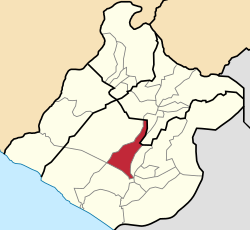Alto de la Alianza Distrito de Alto de la Alianza | |
|---|---|
 Location of Alto de la Alianza in the Tacna Province | |
| Country | |
| Region | Tacna |
| Province | Tacna |
| Founded | May 9, 1984 |
| Capital | La Esperanza |
| Government | |
| • Mayor | Willy Méndez |
| Area | |
• Total | 371.4 km2 (143.4 sq mi) |
| Elevation | 620 m (2,030 ft) |
| Population | |
• Total | 35,429 |
| • Density | 95/km2 (250/sq mi) |
| Time zone | UTC-5 (PET) |
| UBIGEO | 230102 |
| Website | munialtoalianza.gob.pe |
Alto de la Alianza District is one of ten districts of the province Tacna in Peru. [1]
